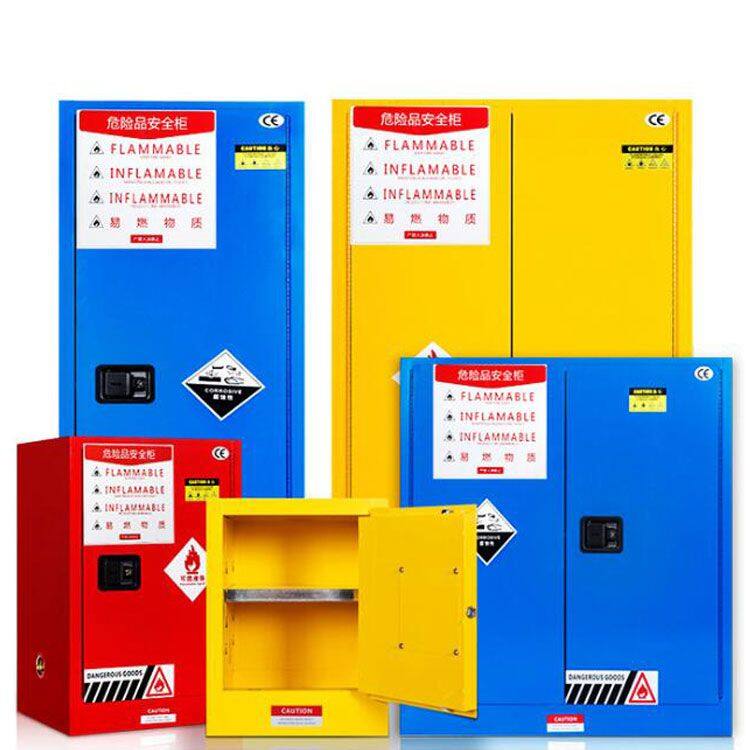-
 Sarah
Hi there! Welcome to my shop. Let me know if you have any questions.
Sarah
Hi there! Welcome to my shop. Let me know if you have any questions.
Your message has exceeded the limit.

Farm Chemical Safety: Proper Storage Solutions with Agricultural Flammable Cabinets
2025-11-06 13:59:24
Agricultural operations handle numerous flammable chemicals including pesticides, herbicides, fertilizers, and fuel that require specialized storage solutions to ensure both worker safety and environmental protection. The implementation of appropriate agricultural flammable cabinets represents a critical safety measure that protects farm workers, crops, and surrounding ecosystems. This comprehensive guide explores the specific requirements for chemical storage in agricultural settings and how proper implementation can enhance both safety and operational efficiency.
Agricultural Chemical Inventory Management
Farms and agricultural operations maintain diverse chemical inventories that vary based on crop types, farming practices, and seasonal requirements. Common flammable chemicals include petroleum-based pesticides, fuel additives, solvents, and cleaning agents used in equipment maintenance. The specific chemical inventory varies significantly between different types of agricultural operations, requiring customized storage solutions.

Inventory management must consider both the quantities used during growing seasons and the storage requirements for off-season periods. Agricultural operations often need to store sufficient chemicals for entire growing seasons, requiring substantial storage capacity while maintaining safety protocols. This seasonal variation influences storage cabinet selection and placement within farm facilities.
Rural Location and Emergency Response Considerations
Agricultural facilities are often located in rural areas with limited access to emergency services, making fire prevention and emergency response particularly critical. Flammable storage cabinets should be positioned to allow emergency vehicle access while maintaining appropriate separation from buildings and ignition sources. Some agricultural operations coordinate with local fire departments to ensure emergency responders are familiar with facility layouts and chemical storage locations.
Rural location considerations extend to communication systems and emergency notification procedures. Agricultural facilities should establish clear protocols for reporting incidents and coordinating emergency response. Some operations implement automated alert systems that can notify emergency responders and nearby residents in case of chemical incidents, ensuring comprehensive emergency preparedness.
Weather and Environmental Protection
Agricultural storage cabinets must withstand various weather conditions including temperature extremes, humidity, and precipitation. Outdoor storage solutions should be constructed with weather-resistant materials and protective coatings that prevent corrosion and maintain structural integrity. Some agricultural operations implement climate-controlled storage areas that protect chemicals from temperature fluctuations and UV exposure.
Environmental protection considerations extend to preventing chemical contamination of soil, water sources, and crops. Agricultural facilities should implement secondary containment systems that prevent leaks from reaching the environment. Some operations use impermeable flooring or containment berms around storage areas to provide additional environmental protection and regulatory compliance.

Seasonal Storage Requirements
Agricultural operations experience significant seasonal variations in chemical usage and storage needs. During peak growing seasons, chemical usage increases dramatically, requiring accessible storage that supports efficient operations. During off-season periods, chemicals may be stored for extended periods, requiring long-term storage solutions that maintain chemical stability and safety.
Seasonal considerations extend to inventory management and chemical rotation. Agricultural facilities should implement first-in-first-out inventory systems that ensure older chemicals are used before expiration dates. Some operations implement seasonal inventory audits that assess chemical condition and determine appropriate disposal or replacement needs, ensuring chemical effectiveness and safety.
Integration with Farm Operations
Flammable storage cabinets should be integrated with overall farm operations to support efficient workflow while maintaining safety protocols. Storage placement should consider the flow of chemicals from storage to application areas, minimizing transport distances and exposure risks. Some agricultural operations implement mobile storage solutions that can be repositioned based on seasonal needs or changing field locations.
Operational integration benefits extend to supporting various farming activities including crop spraying, equipment maintenance, and pest control. Storage systems should accommodate the specific needs of different farming operations while maintaining consistent safety standards. Some agricultural operations implement centralized storage areas that serve multiple farming activities, improving efficiency while maintaining safety protocols.
Worker Safety and Training
Agricultural workers often have varying levels of experience with chemical handling and storage procedures, requiring comprehensive training programs. Training should cover specific chemical hazards, proper storage procedures, personal protective equipment requirements, and emergency response protocols. Regular training updates ensure that workers remain current with safety practices and regulatory requirements.

Worker safety considerations extend to providing appropriate personal protective equipment and ensuring proper usage. Agricultural facilities should maintain adequate supplies of gloves, goggles, respirators, and protective clothing. Some operations implement safety incentive programs that encourage worker participation in safety initiatives and promote awareness of chemical safety practices.
Regulatory Compliance for Agricultural Operations
Agricultural facilities must comply with various regulations including EPA’s Worker Protection Standard, state agricultural chemical regulations, and local fire codes. These regulations establish specific requirements for chemical storage, worker protection, and emergency planning. Agricultural operations must understand these various requirements to ensure comprehensive compliance.
Compliance considerations extend to documentation requirements, worker training records, and emergency response planning. Agricultural facilities should maintain comprehensive records of chemical inventories, storage locations, and safety procedures. These records must be readily available for regulatory inspections and support continuous improvement of safety programs.
Cost-Effective Storage Solutions
Agricultural operations often operate under budget constraints that require careful consideration of storage solution investments. Cost-effective solutions may include modular systems that can be expanded as operations grow or shared storage solutions between multiple farming activities. Some agricultural operations qualify for government grants or cost-sharing programs that help offset storage equipment costs.
Cost-effectiveness extends to supporting various farm management objectives including crop yield optimization, operational efficiency, and regulatory compliance. Proper chemical storage prevents product loss due to contamination or degradation, protecting crop quality and yield. Some agricultural operations report improved chemical management and reduced waste after implementing organized storage systems, demonstrating significant financial benefits.
Community and Environmental Stewardship

Agricultural facilities have a responsibility to protect surrounding communities and environments from chemical exposure and contamination. Flammable storage cabinets should be positioned to minimize potential impact on neighboring properties and water sources. Some agricultural operations implement community outreach programs that inform neighbors about chemical safety practices and emergency procedures.
Environmental stewardship considerations extend to sustainable farming practices and integrated pest management. Proper chemical storage supports these practices by preventing over-application, reducing chemical waste, and protecting beneficial organisms. Some agricultural operations use storage cabinet organization as part of their sustainability initiatives, demonstrating commitment to environmental responsibility and community protection.
Tags: Farm Chemical Safety, Proper Storage Solutions, Agricultural Flammable Cabinets

